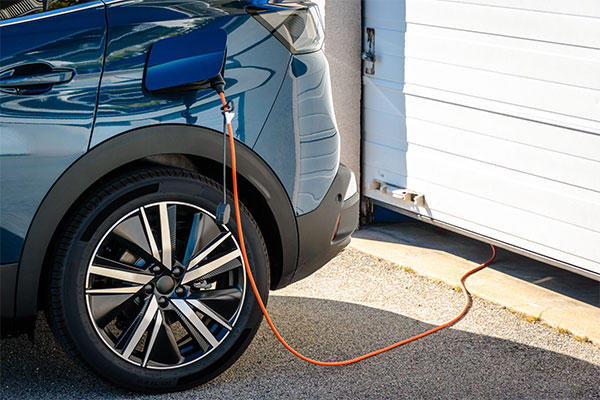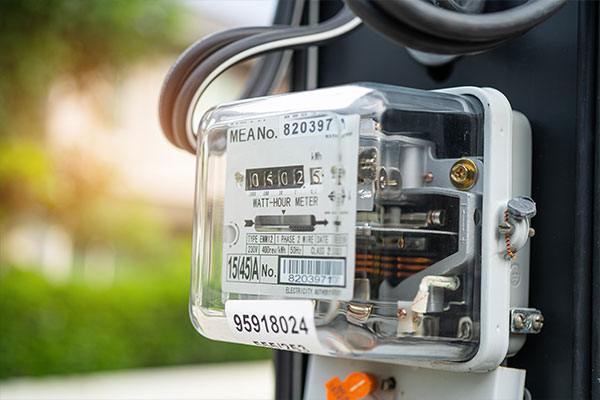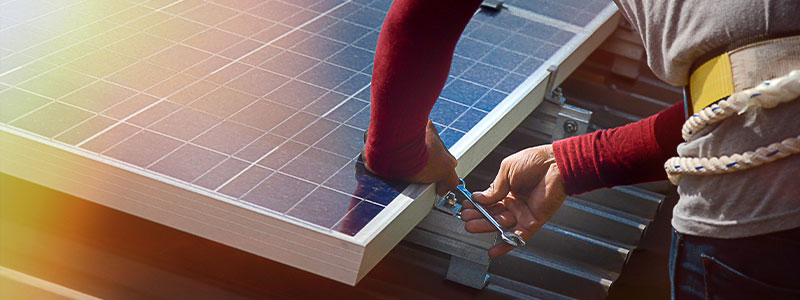Solar Panel Installation
First, our team will evaluate your home and your electricity use to see if solar makes sense. We'll also do all the legally required paperwork for you before we install your solar array.
Here's what happens after you contact us about going solar:
SECTION ONE
Evaluate Your Home's Energy Use
Evaluate Your Home's Energy Use
Solar is a great choice for most homeowners, but it doesn't make sense for everyone.
A home energy audit can determine if a solar array will help you save money.
Start with a home energy audit.
In an energy audit, we take a look at your lighting, appliances, and heating and cooling systems.
We'll also explore places where energy may be escaping from your home. The cracks around doors and windows along with the attic vents, for example, can all add up to some significant energy loss.
You'll save more power and money by converting to LED light bulbs and energy efficient appliances. You may also want to weatherize your home with added insulation or a radiant barrier.
Our home energy audit can help you determine the right steps to take before you even get started with solar.

SECTION TWO
Estimate Your Electricity Needs & Determine Your Home's Solar Potential
Estimate Your Electricity Needs & Determine Your Home's Solar Potential
Before you invest in an array, you need to know how much electricity you need and how much solar energy your home can produce.
How much electricity do you use?
If you are estimating your power usage and expenditure, you may assume you pay a lot less — or a lot more — than you really do. Review a year's worth of electric bills. How many kilowatt-hours (kWh) did you use each month? While some months will be higher than others, run an annual average. How much can you really save with solar?
Also, consider any changes you plan to make. If you are going to purchase an electric vehicle, for instance, your electricity use will spike. On the other hand, installing energy-saving appliances may make your bills go down.
Before you invest in an array, you will also need to know how much solar energy your home can produce.
Many factors determine a site's potential. Shade trees may deflect sunlight, or the slope or position of your roof may mean it receives light only a few hours a day.
You'll also want to assess the structural integrity of your roof. If your shingles will need replacing in a few years, you should probably plan to take care of that project before you install a solar system.


SECTION THREE
Review Financing Options & Incentives
Review Financing Options & Incentives
How do you plan to pay for your solar panels?
While some homeowners pay in cash for this investment, most people rely on loans or other financing options.
Most residential solar arrays cost around $30,000 including installation.
If that number scares you, check out our breakdown of your initial investment before continuing.
While some homeowners can shell out cash for this investment, most people rely on a personal loan or other financing option.
When we meet with you, we'll share your options for loans, Home Equity Lines of Credit (HELOCs), HomeStyle Energy Mortgages, and other vehicles that can help you cover the cost of solar panels. You can read more about these financing options on our Financial Benefits page.
Plus, we'll help you discover how much you can save in federal and state income taxes through current tax benefit initiatives. Most homeowners can cover about half the cost of their solar array and installation through tax benefits alone. On top of that, you'll never see another energy bill again!
We'll do the math with you to see if solar makes sense for your home.

SECTION FOUR
What Happens on the Day of Installment?
What Happens on the Day of Installment?
We handle almost everything on your installation day so you can start your energy lifestyle change with confidence.
We make sure your installation day is exciting, not nerve-wracking.
After receiving all the approvals the local government requires, we'll order your solar array and come out to inspect your roof. Once we receive the panels and ensure that the roof meets all our requirements, we can start installing your new solar array.
On the day of installation, we'll screw in the racks, hang the panels on the racks, install the proper wiring, and connect the inverters. Your energy company will need to send an inspector after installation before we can switch on your new panels.

SECTION FIVE
Important Questions to Ask Your Solar Installer
Important Questions to Ask Your Solar Installer
- How long will my solar installation take? The actual installation usually takes one full day. However, it may be 3-4 months from the time we first meet until your solar panels get switched on. Exactly how long is determined by how fast your utility company and local government officials can move.
- How long will my new solar array last? Modern solar arrays last 25-30 years. That doesn't mean your panels will expire in 25 years, but their productivity will start to decline. Currently, engineers are working to develop systems that will last up to 50 years. Over your panels' lifetime, they will need regularly scheduled cleaning but should not require other maintenance.
- What warranties do you offer on labor, materials, and production? Most solar equipment comes with a 20-year warranty on the panels and a 10-year warranty on the inverters. A strong warranty helps ensure that you're getting quality solar equipment that will last.
- How long have you been in business? New solar companies are springing up everywhere. Make sure you have an experienced company that won't make mistakes or let you down. Our company has existed since 2000, and we have no liens, lawsuits, or judgements against us. We are proud to hold an A+ rating with the Better Business Bureau and a 5-star customer satisfaction rating on Google.
- Are you licensed and insured? A contractor should hold a valid electrician's license. You can check with the South Carolina Department of Labor, Licensing, and Regulation. Our installation company, Anderson Metal Roofing, is fully insured to protect your investment.
- Who takes care of inspections and building permits? We do!
- How do I know if my solar system is working? We will send you a monthly energy use report. If you suspect a problem with your system, give us a call.
Ready to talk?
If you’re ready to find out what kind of energy generating potential your home has, give us a call.
We’ll be glad to talk with you about your options and set up a time to come take a look at your property so we can have a discussion about the real numbers you can expect. Call us today at (864) 775-8508 or request a consultation online.
